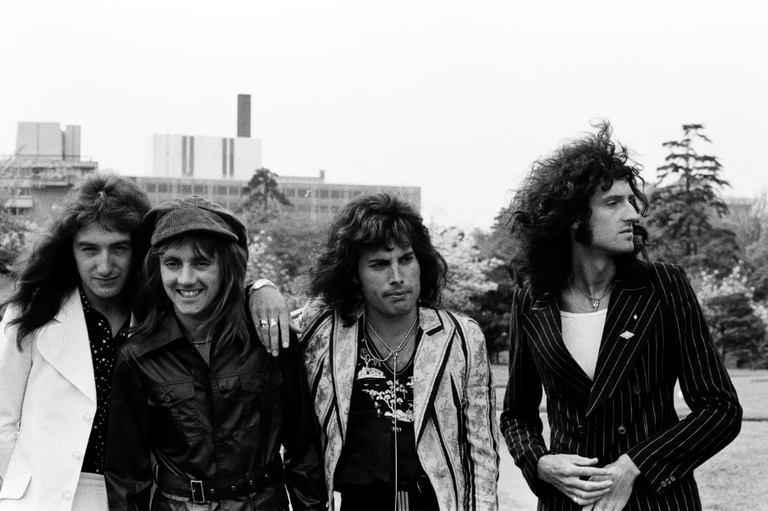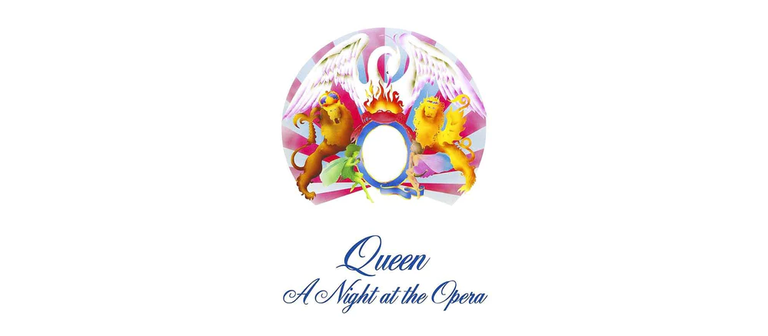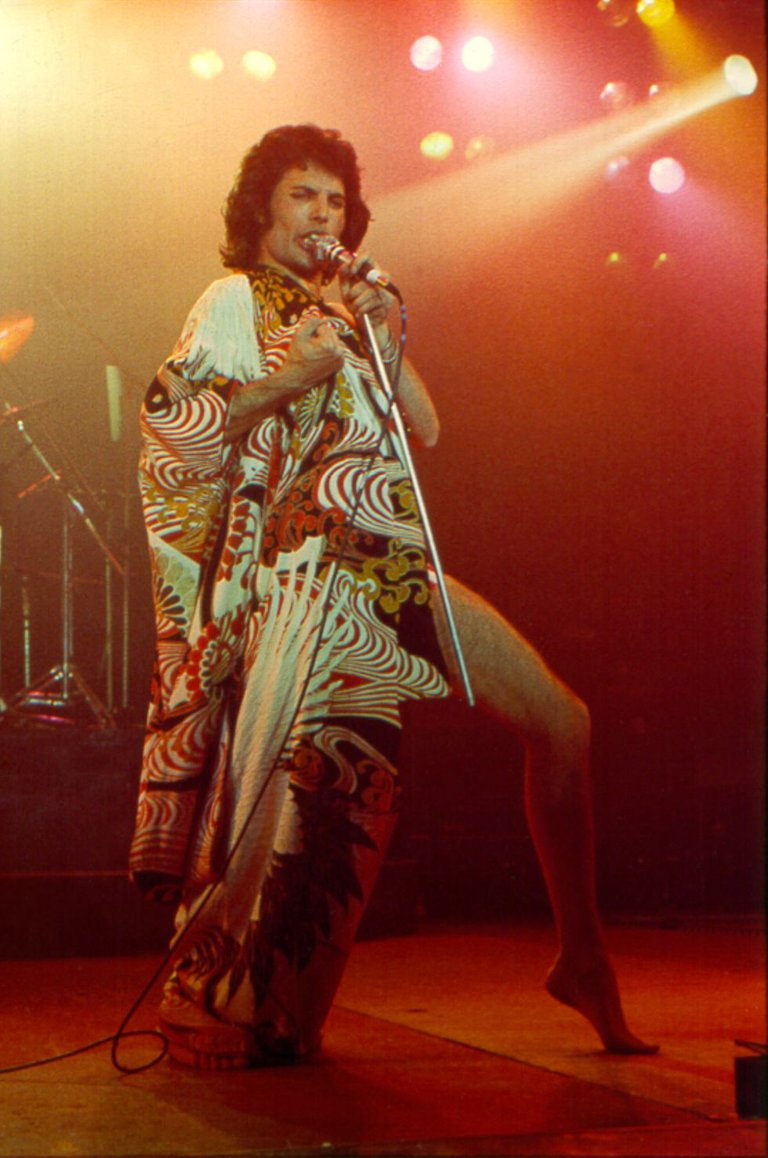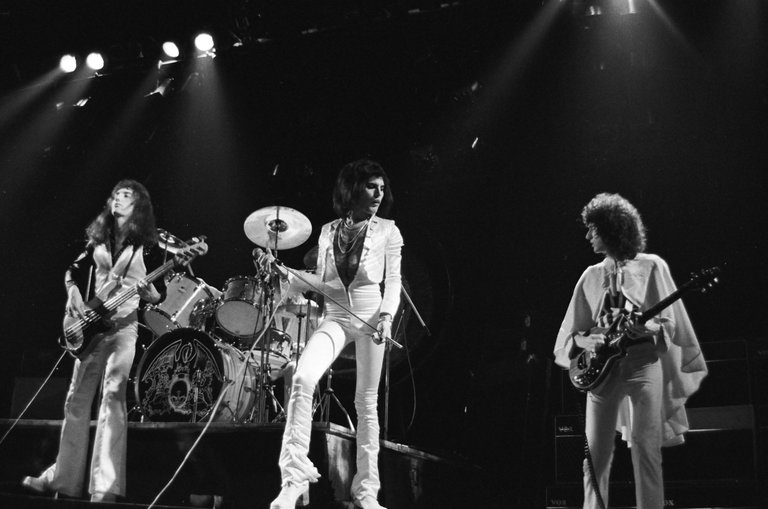An anthem for hate: "Death On Two Legs" (1975) by Queen. (ENG/ESP).
Queen is a band that I could describe with many adjectives, but sometimes I think it doesn't even need an introduction. Once I started listening to them, their music permeated my ear as if it had always been there, and was just waiting for me to find my way back to it. Queen, as their name says, is a musical queen, and in this song that I present to you which is one of my favorites from the album "A Night At The Opera" (1975), we will see a ruthless, mocking and cruel queen from the voice of Freddie Mercury.
Queen es una banda que podría describir con muchos adjetivos, pero a veces pienso que ni siquiera necesita presentación. Una vez que empecé a escucharlos, su música quedó impregnada en mi oído como si siempre hubiese estado allí, y sólo estaba esperando a que encontrara mi camino de vuelta a ella. Queen, como lo dice su nombre, es una reina musical, y en esta canción que les presento que es una de mis favoritas del álbum “A Night At The Opera” (1975), veremos a una reina despiadada, burlona y cruel desde la voz de Freddie Mercury.
 Source
Source
Injustices happen to all of us, and we all have different ways of "settling accounts" when we suffer disrespect or aggressions against us. In the case of artists, it is common to observe that in their lyrics they unload all the feelings that in other conventional ways, far from art, would be censored. Now, the trick in this is to create a quality piece of music, without looking like a resentful person (although there will always be opinions that differ, and they are in favor that addressing the problem in this way is an act of immaturity) and that allows you to drain all the feelings that weigh you down, because injustice weighs a lot.
A todos nos pasan injusticias, y todo tenemos maneras diferentes de “saldar cuentas” cuando sufrimos irrespetos o agresiones hacia nuestra persona. En el caso de los artistas, es común observar que en sus letras descargan todo el sentir que de otros modos convencionales alejados del arte, serían censurados. Ahora, el truco en esto es crear una pieza musical de calidad, sin que te veas cómo un resentido (aunque siempre habrán opiniones que difieran, y estén a favor que dirigirse respecto al problema de ese modo es un acto de inmadurez) y que te permita drenar todos los sentimientos que te pesan, porque la injusticia pesa y mucho.
 Source
Source
This is how Freddie, a shy and reserved man in his daily life, but a flamboyant musical beast with no limits to speak his mind, wrote "Death On Two Legs" dedicated to a very special person: the former manager of the band, Norman Sheffield, who was also the first manager who accompanied the band in its musical beginnings, during the period in which the albums Queen (1973); Queen II (1974) and Sheer Heart Attack (1974) were released. What did this man do to receive so much pent-up anger in one song? Well, it turns out that the band in its early days faced rejection and mistrust, typical of a musical project that big industry executives are afraid to bet on, for fear of losing their money. However, Queen demonstrated talent and a striking stage presence from the very beginning.
Así es como Freddie, un hombre tímido y reservado en su vida diaria, pero una bestia musical extravagante y sin límites para decir lo que piensa, escribió “Death On Two Legs” dedicado a una persona muy especial: el antiguo mánager de la banda, Norman Sheffield, quién fue también el primer mánager que acompañó a la banda en sus inicios musicales, durante el período en el que salieron los álbumes: Queen (1973); Queen II (1974) y Sheer Heart Attack (1974). ¿Qué fue lo que hizo este hombre para recibir tanta ira contenida en una canción? Bien, resulta que la banda en sus inicios se enfrentó al rechazo y a la desconfianza, lo típico de un proyecto musical al que los grandes ejecutivos de la industria temen apostar a favor, por temor a perder su dinero. Sin embargo, Queen demostró desde el principio talento y una presencia en el escenario impactante.
 Source
Source
 Source
Source
Thus, the successes were not long in coming and it was with Sheer Heart Attack (1974) that they achieved international fame, with hits such as "Killer Queen". It was logical to think that thanks to the success, the economic benefits would not be a problem, especially being under the protection of the Sheffield brothers, who owned Trident Studios. This company witnessed the musical talent of artists such as David Bowie and Elton John, including recordings of songs like "Hey Jude" (1968) by the Beatles. Despite this, the members of Queen were not fully enjoying their profits, and were only recording when the aforementioned artists had left the studio, and on top of that, on a financial level they were receiving payments not comparable to what was being obtained from their rapid success with their first albums. Furthermore, their money was being withheld and they could not freely invest in improving their musical output without first receiving a no, as when Freddie wanted a grand piano which was denied, or when Roger Taylor was told not to hit the drums too hard because he could not afford new drumsticks.
De este modo, los éxitos no se hicieron esperar y fue con Sheer Heart Attack (1974) lo que logró que consiguieran fama internacional, con éxitos como “Killer Queen”. Era lógico pensar que gracias al éxito, los beneficios económicos no serían problema, sobre todo estando bajo el amparo de los hermanos Sheffield, quienes eran dueños de los estudios Trident. Esta compañía fue testigo del talento musical de artistas como David Bowie y Elton John, incluso de grabaciones de canciones como “Hey Jude” (1968) de los Beatles. A pesar de esto, los miembros de Queen no gozaban enteramente de sus beneficios, y les tocaba grabar sólo cuando los artistas antes mencionados se habían ido del estudio, y encima de eso, a nivel financiero estaban recibiendo pagos nada comparables con lo que se estaba obteniendo de su rápido éxito con sus primeros álbumes. Además, su dinero estaba siendo retenido y no podían invertir libremente en mejorar su producción musical sin antes recibir un no, como cuando Freddie quería un piano de cola que le fue negado, o cuando a Roger Taylor le dijeron que no debía golpear la batería muy fuerte porque no se podía permitir nuevas baquetas.
 Source
Source
It is understandable then that, when the band cut their professional ties with Sheffield (and not in a very friendly way) and got a new manager who also represented Elton John, this being John Reid, it seems that Freddie thought that he had not said enough, that he should keep the last word. This is how he creates a song whose lyrics are rude, brutal, violent; full of rancor and anger. In "Death On Two Legs" Freddie vents his frustrations at feeling robbed and used, and compares his former manager to a leech, an old mule, a sewer rat, and even suggests that he should consider suicide. The hatred and contempt immersed in this song are so powerful that when I listen to it, I can feel them as my own. Besides, the sound is no slouch, because the song sets these feelings to perfection with a piano solo that leads into a high-pitched scream, and a crescendo starring the guitar, and then we hear choruses that spit out the words.
Es entendible entonces que, cuando la banda cortó sus lazos profesionales con Sheffield (y no de manera muy amistosa) y se consiguieron a un nuevo mánager quién además representaba a Elton John, siendo este John Reid, parece que Freddie pensó que no había dicho lo suficiente, que debía quedarse con la última palabra. Así es como crea una canción cuya letra es grosera, brutal, violenta; llena de rencor y de ira. En “Death On Two Legs” Freddie ventila sus frustraciones por sentirse robado y usado, y compara a su ex mánager con una sanguijuela, una vieja mula, una rata de alcantarilla, e incluso le sugiere que debería considerar el suicidio. El odio y el desprecio inmersos en esta canción son tan poderosos que cuando la escucho, puedo sentirlos como propios. Aparte, el sonido no se queda atrás, porque la canción ambienta estos sentimientos a la perfección con un solo de piano que da entrada a un grito agudo, y un crescendo protagonizado por la guitarra, para luego escuchar coros que escupen las palabras.
It was to be expected that this song would bring an unsuccessful lawsuit from Norman, who also in his autobiographical book "Life On Two Legs: Set the Record Straight" talks about the artists who passed through Trident and of course could not miss the moment to clear his name. Ironically, it was thanks to the lawsuit he filed against the band that it became official that he was the walking dead, or in other words, that he was the one to whom the song was addressed. Listening to it in its studio version inspires a powerful feeling, but it is even more so when you listen to it live, as Freddie with very little decorum presents the song in a rather insulting way, and we can't not highlight the fact that it is the introduction to one of Queen's best albums, and I consider it one of the greatest in rock. I hope you enjoyed this post. See you in the next one!
Era de esperar que esta canción acarreara una demanda infructuosa por parte de Norman, quien además en su libro autobiográfico “Life On Two Legs: Set the Record Straight” habla de los artistas que pasaron por Trident y por supuesto no podía dejar pasar el momento para limpiar su nombre. Irónicamente, gracias a la demanda que presentó a la banda es que se hizo oficial que él era la muerte andante, o en otras palabras, que era a él a quién estaba dirigida la canción. Escucharla en su versión estudio te inspira una sensación poderosa, pero lo es aún más cuando la escuchas en vivo, ya que Freddie con muy poco decoro presenta la canción de una manera bastante insultante, y no podemos no destacar el hecho de que es la introducción a uno de los mejores álbumes de Queen, y considero yo que uno de los más grandes en el rock. Espero que hayan disfrutado esta publicación ¡Nos vemos en una próxima!
 Source
Source
